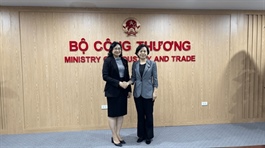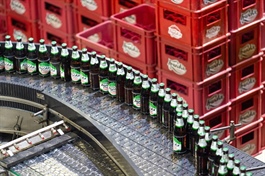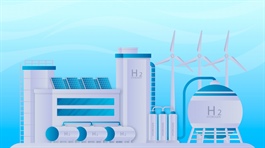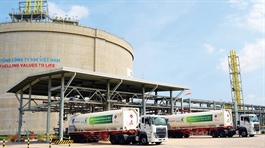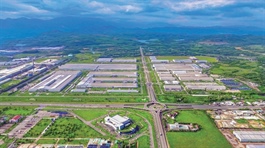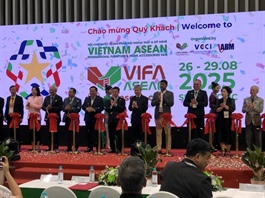EPR crucial to promote responsibility
EPR crucial to promote responsibility
The development of a separate decree on extended producer responsibility is expected to create a clear, consistent, and practical legal framework, facilitating businesses in fulfilling their responsibilities.
The Ministry of Agriculture and Environment (MoAE) is publicly soliciting opinions from agencies, organisations, businesses, and relevant stakeholders on the draft decree regulating the recycling responsibilities for products and packaging, as well as the waste management responsibilities of producers and importers.
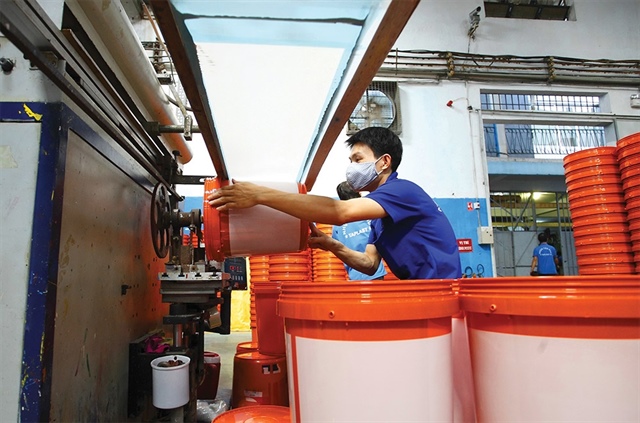
EPR is gradually being embraced by businesses as a vital part of their sustainability strategies, photo Le Toan |
Ho Kien Trung, deputy director of the Department of Environment under the MoAE, said extended producer responsibility (EPR) is a crucial policy tool to promote the responsibility of producers and importers in collecting, recycling, and managing post-use products and packaging.
“The 2020 Environmental Protection Law marks a significant milestone by clearly stipulating the recycling and waste management responsibilities of producers and importers,” Trung said.
“However, as EPR is a new policy, some regulations still need clarification and resolution. Thus, this decree not only specifies the mechanisms for implementing the responsibility but also clarifies regulations on financial mechanisms to support recycling and waste management, creating a transparent, feasible legal framework aligned with the practical requirements of environmental management in the new era.”
The draft 2025 EPR decree largely incorporates the provisions of Decree No.08/2022/ND-CP on elaboration of several articles of the Law on Environmental Protection and Decree No.05/2025/ND-CP, which amend and supplementing a number of articles of Decree 08, while supplementing and clarifying certain regulations based on practical implementation.
It also provides detailed provisions on mechanisms to support recycling and waste management funded by contributions from producers and importers.
“Recent practical experience shows EPR is a new policy with a broad scope, affecting various groups such as producers, importers, and recycling businesses,” said Nguyen Hung Thinh, deputy director of the Department of Environment and a representative of the decree drafting committee.
“However, many businesses still face limitations in accessing and fully understanding EPR regulations due to the lack of a cohesive regulatory system. Currently, EPR-related provisions are integrated into comprehensive environmental decrees, which results in fragmented regulations that are difficult to reference and implement consistently,” Thinh added.
The decree drafting committee noted that developing a standalone decree comprehensively addressing EPR is both necessary and appropriate. Consolidating all EPR-related regulations into a single, independent legal document not only addresses current shortcomings but also systematises regulations in a centralised, unified, and transparent manner. This facilitates businesses in referencing and fulfilling their responsibilities, as well as supports state agencies in providing guidance, management, and oversight.
At the Green Packaging Forum in Hanoi two weeks ago, Nguyen Thanh Yen, deputy head of the Legal Issues and Policies Division of the Department of Environment under the MoAE, emphasised the central role of businesses in implementing EPR and boosting the circular economy.
He mentioned that EPR is gradually being embraced by businesses as an indispensable part of sustainable development strategy. The policy is not only about the collection and treatment of post-consumer packaging but also serves as a starting point for businesses to improve product design, optimise packaging materials and lifecycle, better manage recycling processes, and minimise environmental impact.
“In the fast-moving consumer goods sector, where packaging has a short lifecycle and high consumption rate, EPR helps businesses enhance their competitive capacity, increase compliance with international standards, and gradually integrate into global supply chains with stricter requirements on ESG,” Yen added.
Bui Le Thanh Khiet, head of the Plastic Waste Circular Economy Group at the Institute for Circular Economy Development, said the food and beverage industry is most affected by EPR due to the volume of packaging discarded annually.
According to Wifitalents’ Food Packaging Industry Statistics 2025, approximately 78 million tonnes of plastic from food packaging are generated every year. Businesses are required to declare and report through the national electronic EPR system and can choose to recycle on their own or contribute to the Environment Protection Fund.
“First and foremost, businesses need to invest in collection, classification, and recycling infrastructure, promote the application of modern processing technologies, expand cooperation with environmental technology startups, and implement digital transformation in packaging and waste management,” Khiet stated.
In the food sector, Sao Khue Food JSC (SKfood) has launched rice straws, a small product with great environmental value since 2019.
This type of straw can biodegrade on its own, without the need for collection. If released into the water environment, it will become food for fish, and when it enters the soil, it will decompose into natural fertiliser.
Pham Thi Bich Phuong, sales director of SKfood, stated, “Exporting to demanding markets implies that products must meet strict environmental standards. By meeting them, SKfood has quickly conquered the European market, where plastic straws are completely banned.”
- 10:06 28/08/2025









